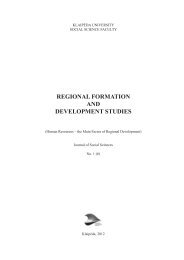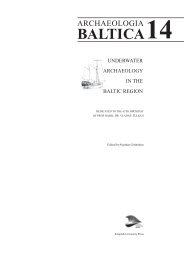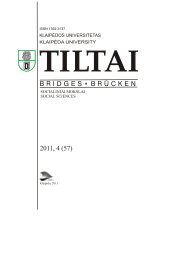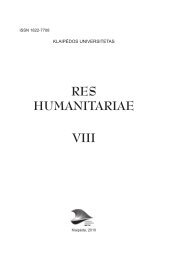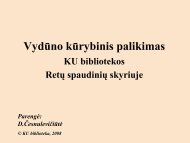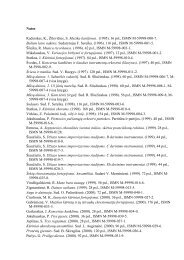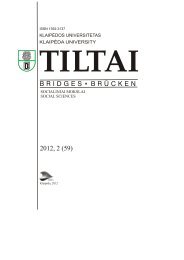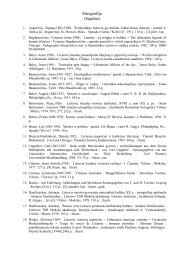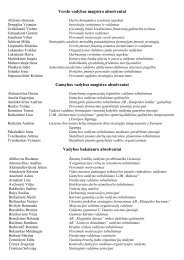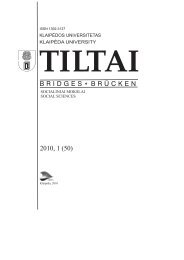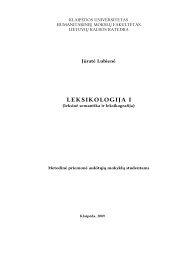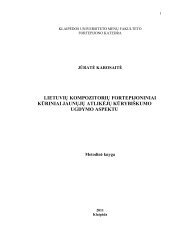BALTICA10
BALTICA10
BALTICA10
You also want an ePaper? Increase the reach of your titles
YUMPU automatically turns print PDFs into web optimized ePapers that Google loves.
ARCHAEOLOGIA BALTICA 10<br />
IN MEMORIAM: IZOLD PUSTYLNIK<br />
(17 March 1938 – 2 May 2008)<br />
Izold Pustylnik, eminent astronomer and senior research<br />
associate at the Tartu Observatory, and member<br />
of SEAC (La Société Européenne pour l’Astronomie<br />
dans la Culture), died in the early morning of May 2,<br />
2008.<br />
Izold Pustylnik was born on March 17, 1938 into a<br />
family of millers in Odessa, Ukraine, as an only child.<br />
During World War II he was evacuated together with<br />
his mother to Uzbekistan. He lost his father in the war.<br />
After the war they returned to Odessa where Izold<br />
graduated from secondary school with high grades and<br />
from Odessa University cum laude. His interests in<br />
astronomy developed under the guidance of V. Tsessevich<br />
who was one of the leading researchers on close<br />
binary stars.<br />
After a short period as a young scientist in Odessa and<br />
Kiev he applied in 1962 for a postgraduate position at<br />
the Institute of Physics and Astronomy in the Academy<br />
of Sciences of the then Estonian Soviet Socialist<br />
Republic. Remarkably, only three months after starting<br />
his postgraduate studies, Izold delivered his first academic<br />
seminar report at the Institute in Estonian. His<br />
skills in acquiring new languages were impressive: in<br />
the Institute’s personnel records of 1992 Izold rated his<br />
command of Russian, Estonian, English and Polish as<br />
excellent; Ukrainian, German and French as languages<br />
he could read and translate; and Hungarian as a language<br />
he commanded at conversational level.<br />
Following his postgraduate studies, Izold obtained the<br />
degree of Candidate of Science from the University of<br />
Tartu in 1958. In 1994 he was awarded a DSc from<br />
Saint Petersburg State University.<br />
During the entire time he worked at the Tartu Observatory,<br />
Izold researched close binary systems – stars that,<br />
by orbiting very close to each other around a common<br />
centre of mass, help us to learn more about stars in general<br />
than can be done by studying single stars alone.<br />
He even defined a new category of stars – gas-eclipsed<br />
close binaries, which are binaries orbiting around each<br />
other in a common gas envelope. During the last decade<br />
he studied the subdwarf components of pre-cataclysmic<br />
binaries, trying to understand their structure,<br />
spectral features and evolution.<br />
Though mainly a theoretician, Izold was active – and,<br />
over a very long period in his earlier academic career,<br />
also involved – in observing binary systems.<br />
In recent years Izold took an interest in famous astronomers<br />
connected both with Estonia and Russia.<br />
Together with Vitalii Bronshten, he published a monograph<br />
on Ernst Julius Öpik, one of the best-known<br />
Estonian astronomers. Izold also wrote about Stanislavs<br />
Vasilevskii, a Latvian astronomer whose talent<br />
had remained hidden in the tumult of the 20th century,<br />
and thoroughly investigated the life and work of Erich<br />
Schoenberg, the German-Estonian astronomer who<br />
worked at the Tartu Old Observatory.<br />
273



